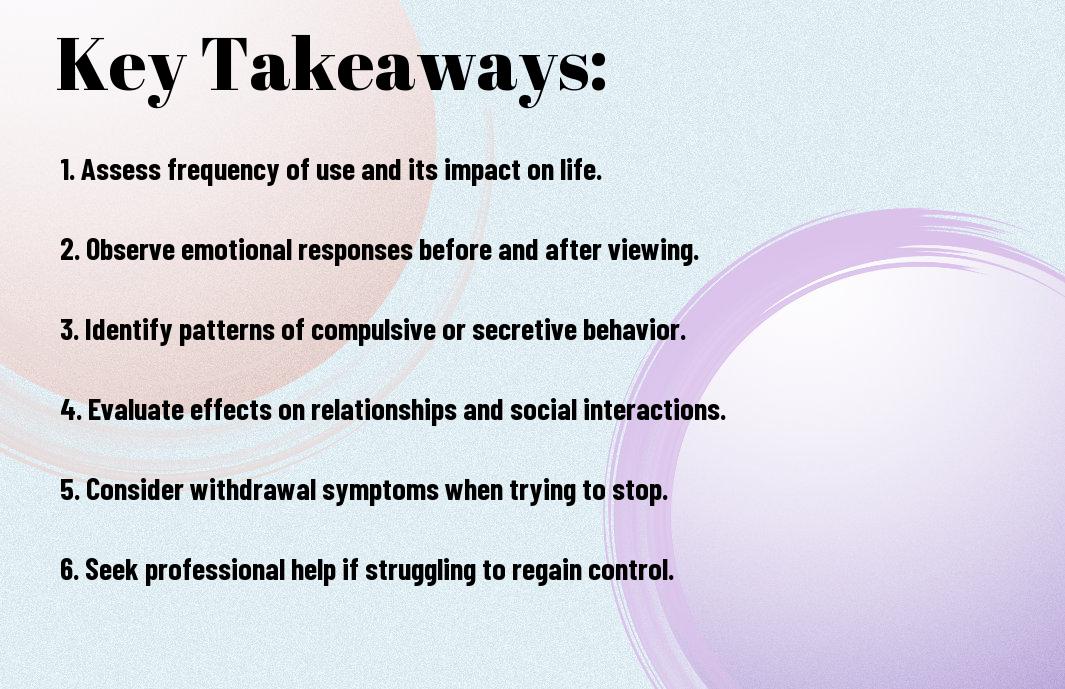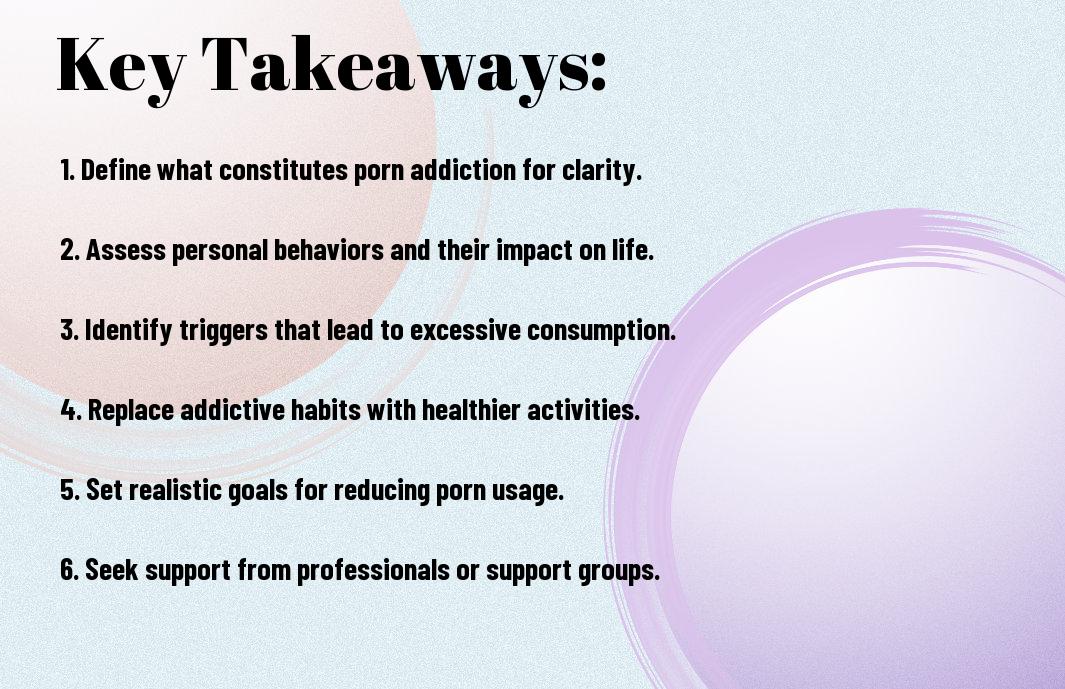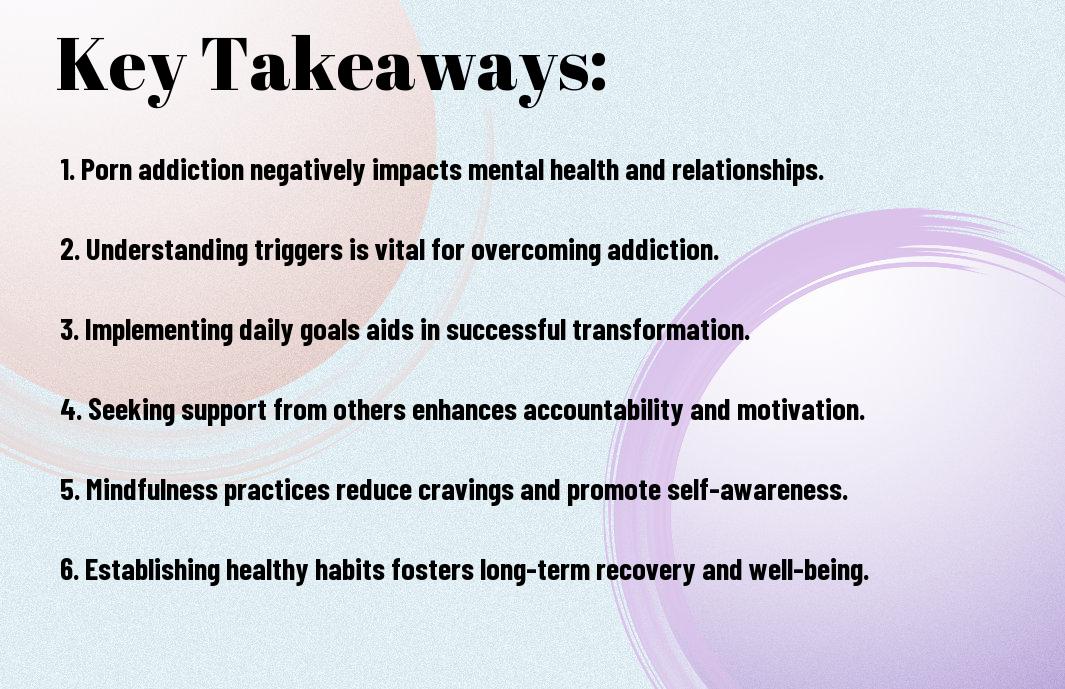There’s a growing awareness around the effects of excessive porn consumption, and recognizing whether it has become an addiction can be life-changing. Understanding the signs of porn addiction is imperative for your emotional and mental well-being. In this post, you’ll discover five powerful transformations that will help you identify if your relationship with pornography is unhealthy, enabling you to take proactive steps towards a more balanced and fulfilling life.
Key Takeaways:
- Understand the signs of porn addiction, such as compulsive use and neglecting daily responsibilities.
- Assess your emotional well-being and note how porn consumption affects your relationships and mental health.
- Identify triggers and situations where you are more likely to turn to porn, promoting self-awareness.
- Consider the impact of porn on your sexual expectations and experiences, comparing fantasy to reality.
- Seek support through therapy, counseling, or support groups to address addiction and promote healing.
- Adopt healthier coping mechanisms to manage stress and emotions instead of relying on porn as an escape.
- Commit to personal growth and transformational changes, focusing on building healthier relationships and self-esteem.

Understanding Porn Addiction
For many individuals, the line between healthy sexual exploration and porn addiction can be blurred. It is crucial to understand that porn addiction can significantly impact your daily life, relationships, and mental health. Recognizing the signs and symptoms can empower you to take proactive steps towards healing and reclaiming control over your sexuality.
Defining Porn Addiction
After reviewing various psychological definitions, porn addiction can be understood as a compulsive behavior characterized by persistent engagement with pornography despite negative repercussions. This behavior often leads to a decline in overall well-being, affecting your emotional and social life while creating a disconnect from real intimacies.
Signs and Symptoms
After identifying the definition, it is crucial to recognize the signs and symptoms of porn addiction. You may notice an increase in the time spent viewing porn, as well as feelings of guilt or shame regarding your habits. Additionally, you might find it challenging to maintain intimate relationships or experience a decrease in sexual satisfaction.
Also, other signs may include using porn as a stress-relief mechanism or as an escape from real-life issues. You might prioritize pornography over personal or professional responsibilities, leading to further complications in your life. Being aware of these patterns can help you assess your relationship with porn more effectively and decide if it is time to seek help.

The Impact of Porn on Mental Health
The connection between porn consumption and mental health is significant. Studies show that excessive porn use can lead to increased anxiety, depression, and lower self-esteem. This can create a cycle that negatively impacts your relationships and overall quality of life. Understanding these mental health effects is the first step toward managing and transforming your relationship with porn.
Emotional Effects
Before you can address your porn consumption, it’s important to consider its emotional implications. Many individuals experience feelings of guilt, shame, or embarrassment stemming from their viewing habits. These emotions can decrease your overall happiness and lead to social withdrawal, creating a barrier between you and healthy interactions with others.
Cognitive Consequences
Behind the emotional effects, porn use can also impact your cognitive functioning. Prolonged exposure may alter how you perceive intimacy, relationships, and sexual expectations, leading to distorted beliefs about what is normal and desirable.
Even more concerning is the way porn can affect your brain’s reward system. Regularly consuming porn can create unrealistic standards for sexual experience, leading to difficulty in forming genuine connections with real partners. You may find that your arousal levels decrease when interacting with actual intimacy, ultimately strengthening a cycle of reliance on porn for sexual gratification instead of fulfilling relationships.

Identifying Personal Patterns
Your journey to understanding a potential porn addiction begins by identifying personal patterns that may indicate problematic behavior. Take a moment to reflect on your habits, thoughts, and feelings surrounding pornography use. By examining the ways in which it integrates into your daily life, you can start to unravel whether it has exceeded healthy boundaries and discover the motivations driving your consumption.
Frequency and Compulsion
Across various scenarios, take note of how often you find yourself seeking out pornography and whether you feel compelled to engage in this behavior despite your intentions. If you notice a pattern of increased frequency or a sense of urgency that overrides your better judgment, it may signal an unhealthy attachment to porn. Understanding how these patterns manifest is key to assessing your relationship with this content.
Triggers and Situational Context
Against this backdrop, it is important to examine the triggers and situational contexts that lead you to consume pornography. Identifying specific scenarios—such as feelings of stress, loneliness, or boredom—that precede your use can help paint a clearer picture of what drives your behavior. This awareness can guide you toward healthier coping mechanisms and allow you to make more conscious choices.
Situational contexts often play a significant role in shaping your relationship with pornography. Factors such as stress from work, relationship challenges, or even an idle moment can serve as triggers, pushing you towards seeking fulfillment through porn. Understanding these contexts can help you develop alternative strategies for dealing with triggers, thereby fostering healthier habits and emotional responses when faced with similar situations in the future.

Transformative Steps Toward Recovery
Unlike the notion that overcoming a porn addiction is a solitary endeavor, the journey to recovery often involves a series of transformative steps that can reshape your life. These steps provide a roadmap for regaining control and fostering healthy habits, allowing you to move beyond the confines of addiction and reconnect with your values and desires. Embracing this path not only brings personal growth but also enhances your relationships and overall well-being.
Acknowledgment and Acceptance
Among the first steps in your recovery journey is acknowledging the existence of your porn addiction. Acceptance is pivotal; it involves understanding how this behavior has affected your life and recognizing that change is not only necessary but possible. By owning your experience, you create a strong foundation that will empower you as you move forward on your path to recovery.
Seeking Professional Help
Recovery can be significantly enhanced by seeking professional help.
A qualified therapist or counselor specializing in addiction can provide you with the tools and strategies necessary to confront underlying issues contributing to your addiction. They can guide you in developing healthier coping mechanisms and help you navigate the emotional challenges that arise during recovery. Engaging in group therapy can also foster a sense of community and shared experience, allowing you to connect with others who understand your struggles and victories. Investing in professional support can make a substantial difference in your journey toward lasting change.
Building Healthy Relationships
Keep in mind that developing healthy relationships is vital for overcoming porn addiction. This process involves fostering genuine connections with others, built on trust and openness. By prioritizing these relationships, you can create a support system that encourages growth and healing.
Communication with Partners
By fostering open communication with your partners, you can address any issues related to your addiction. Sharing your feelings, struggles, and progress allows for a deeper understanding and creates a safe space for both you and your partner. This transparency encourages emotional intimacy, which is important for nurturing a healthy relationship.
Establishing Boundaries
To establish boundaries in your relationships, it’s important to know what you need to support your recovery. Clear boundaries can help you maintain a balance between your personal growth and your relationships, preventing feelings of guilt or pressure to engage in behaviors that may hinder your progress.
But setting boundaries requires honesty and self-awareness. You need to articulate your limits to your partner and ensure they understand your goals. This can involve discussing topics like physical intimacy, shared media consumption, and how you navigate social situations. By establishing these boundaries, you create an environment that supports your healing journey, allowing both you and your partner to thrive together.
Maintaining Long-term Recovery
After acknowledging your porn addiction, maintaining long-term recovery becomes paramount. This involves continuous self-reflection, setting personal goals, and fostering healthy habits that support your journey. Engaging in activities that align with your values and contribute positively to your life can significantly enhance your chances of sustained recovery. Embracing a mindset of growth and resilience will help you navigate challenges without falling back into old patterns.
Support Systems
The importance of a supportive network cannot be overstated. Surround yourself with understanding friends or family who respect your journey toward recovery. Consider joining support groups, either in person or online, where you can share experiences and gain insights from others facing similar challenges. Knowing that you are not alone can empower you to stay committed to your recovery process.
Mindfulness and Coping Strategies
By incorporating mindfulness and effective coping strategies into your daily routine, you can better manage triggers and cravings associated with porn addiction. Practicing mindfulness helps you stay present, reducing stress and anxiety that may lead to relapses.
It is crucial to explore various coping techniques, such as meditation, deep-breathing exercises, and journaling, to strengthen your emotional resilience. These practices encourage self-awareness and help you identify thought patterns that may lead to urges. Additionally, creating a list of healthy alternatives to turn to when cravings arise can provide you with immediate options to redirect your thoughts and maintain your focus on recovery.
Conclusion
Drawing together the insights from the five powerful transformations can help you clearly recognize the signs of a porn addiction in your life. By assessing your behaviors, emotions, and interpersonal relationships, you can start to understand such patterns that may indicate a compulsion. Acknowledging these signs is the first step toward making informed changes and seeking support, empowering you to regain control over your habits and foster healthier relationships with intimacy and sexuality.
FAQ
Q: What are the signs that may indicate I have a porn addiction?
A: Some common signs of porn addiction include the inability to control your consumption of pornography, spending excessive time viewing porn, neglecting personal and professional responsibilities, feeling compelled to watch porn even when you want to stop, and experiencing negative emotional states such as guilt or shame after viewing.
Q: How can I differentiate between a healthy interest in porn and an addiction?
A: It’s important to assess the impact of porn on your life. If your interest in porn leads to negative consequences—like relationship issues, impacts on your mental health, or interfering with daily activities—it might be a sign of addiction. In contrast, a healthy interest does not disrupt your life or cause distress.
Q: What are the psychological effects of having a porn addiction?
A: Porn addiction can lead to various psychological effects, including anxiety, depression, low self-esteem, and feelings of isolation. It may also alter perspectives on relationships and intimacy, making it harder to engage in healthy, real-life connections.
Q: Can porn addiction affect my relationships with others?
A: Yes, porn addiction can significantly affect personal relationships. It may lead to decreased intimacy with partners, unrealistic expectations about sex, and feelings of betrayal if a partner discovers the addiction. This can create trust issues and emotional distance in relationships.
Q: What are some effective strategies for overcoming porn addiction?
A: Overcoming porn addiction can involve several strategies, such as setting firm limits on usage, seeking professional counseling or therapy, joining support groups, practicing mindfulness techniques, and replacing porn consumption with healthier activities. Building a support system with friends or family can also be beneficial.
Q: How does recognizing the problem aid in transformation from porn addiction?
A: Acknowledging the existence of a porn addiction is the first step towards recovery. It allows individuals to take responsibility for their actions, seek help, and develop a concrete plan to transform their relationship with pornography. This recognition can empower individuals to make meaningful changes in their lives.
Q: Are there resources available for individuals struggling with porn addiction?
A: Yes, there are numerous resources available for those facing porn addiction. Online forums, support groups, dedicated websites, and professional therapists specialize in sexual health and addiction. Books and apps designed to help manage compulsive behaviors can also be effective tools in the recovery process.










